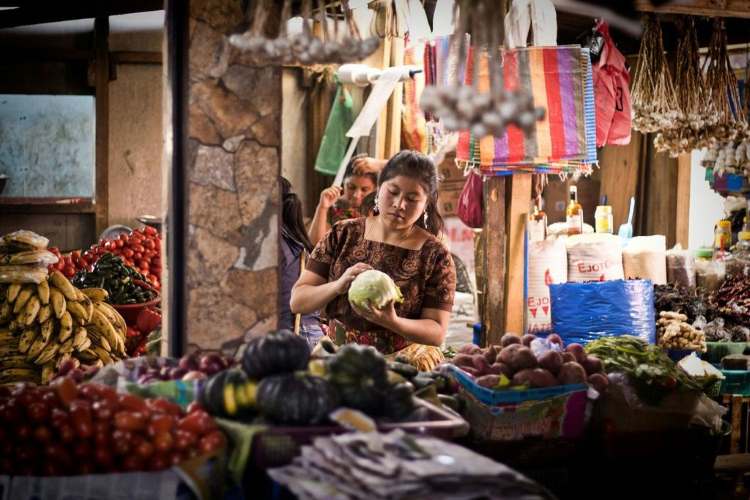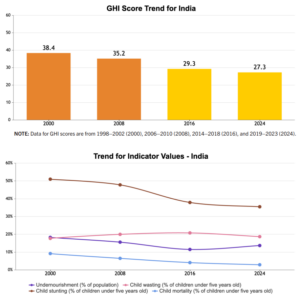
World Food Day 2024 arrives at a time when India faces the dual challenges of malnutrition and the rising incidence of non-communicable diseases, both linked to unhealthy diets. This year’s theme, ‘Right to Food for a Better Life and a Better Future,’ emphasises the importance of making access to nutritious food a fundamental right, paving the way for a healthier and more sustainable future.
Despite being known for its agricultural abundance, India faces a stark irony. While it is a major food producer, a staggering number of its people still suffer from food insecurity and malnutrition. According to the 2024 State of Food Security and Nutrition in the World (SOFI) report, over 55.6% of Indians—more than 788 million people—cannot afford a healthy diet. This alarming statistic reflects the growing inaccessibility of nutritious foods like fruits and vegetables, driven by rising costs and markets flooded with unhealthy, ultra-processed food options.
READ I State governments hold the key to economic prosperity
Right to food and unhealthy diet
Obesity rates in India are climbing sharply, particularly among children. The SOFI report reveals that 2.8% of children under five are now obese, up from 2.2% in 2012. Among adults, 7.3% are affected, a steep rise from 4.1% just two years ago. This surge is largely due to the widespread consumption of ultra-processed foods packed with hidden sugars, excessive salts, and unhealthy fats. These nutrient-poor foods are becoming increasingly prevalent in Indian diets because of their affordability and convenience, overshadowing healthier and more nutritious options.

The report also reviews 35,550 products from the world’s top 20 food and beverage companies across India, Brazil, China, and South Africa, revealing that only 4-12% of their sales come from healthier items. In India, the prevalence of cheap, unhealthy foods has driven up the cost of nutritious options, creating a paradox: while unhealthy foods are plentiful and affordable, the foods essential for a balanced and healthy diet remain out of reach for many. This troubling trend contributes significantly to the rising burden of diet-related NCDs, further straining the country’s healthcare system.
Role of front-of-pack warning labels
To curb the rising consumption of unhealthy foods, Front-of-Pack Warning Labels (FoPWL) should be implemented as a regulatory measure to help consumers make informed choices. FoPWL provides clear, visual indicators about the high levels of harmful ingredients—such as sugar, salt, and saturated fat—in packaged foods. This system is particularly important for busy young consumers and those with limited literacy, who may find traditional nutritional labels difficult to interpret.
Several countries have already adopted FoPWL systems with promising results. India has taken some steps in this direction, with the Food Safety and Standards Authority of India (FSSAI) proposing a star-rating system for packaged foods. However, this draft faced widespread criticism for being less effective than warning labels, as it fails to clearly distinguish between healthy and unhealthy foods. A more effective system would include front-of-pack warning labels featuring distinct symbols or colours indicating high levels of harmful ingredients, steering consumers away from unhealthy choices.
Measures to ensure right to healthy food
Ensuring the right to healthy food requires more than just labelling systems—it demands a comprehensive policy framework that addresses the root causes of food insecurity and unhealthy diets. This includes regulating the marketing of ultra-processed foods, promoting healthier alternatives, and making nutritious foods more affordable. Aggressive marketing of unhealthy foods to children and young adults, often using attractive packaging, celebrity endorsements, and misleading health claims, is a major challenge. Stricter regulations and enforcement are essential, along with government efforts to improve access to healthy foods.
While the country ensures the right to food through schemes like the Pradhan Mantri Garib Kalyan Anna Yojana, which provides free grains to eligible households, and the National Food Security Act, which offers subsidised grains to rural and urban populations, these initiatives fall short in promoting healthier dietary choices. Subsidies for fruits, vegetables, and other nutrient-dense foods, coupled with higher taxes on ultra-processed foods, could effectively shift consumption patterns toward healthier options.
The National Multisectoral Action Plan (2017-2022), aimed at reducing NCD risk factors through laws and campaigns, highlighted unhealthy diets and the aggressive marketing of unhealthy foods and beverages as key challenges. Despite efforts, significant gaps remain, necessitating stronger measures to combat the influence of ultra-processed foods on Indian diets.
India’s rising burden of NCDs threatens to overwhelm the healthcare system and compromise the well-being of future generations. The right to food goes beyond merely satisfying hunger; it’s about ensuring access to nutritious, safe, and affordable food for all. This principle is crucial for achieving the Sustainable Development Goals (SDGs), particularly SDG 2, which aims to eradicate hunger and all forms of malnutrition by 2030. Unfortunately, India lags significantly in reaching this target compared to other development goals.
As we observe World Food Day, let us reaffirm our commitment to ensuring the right to healthy food for all Indians. Regulatory measures like FoPWL are essential, but broader strategies—such as public education and industry accountability—are also critical. Only through comprehensive efforts can we secure a better life for ourselves and a brighter future for the generations to come.
(Amrat Singh is director, CUTS International, and Head, CUTS Centre for Consumer Action, Research & Training. Simi TB is Assistant Policy Analyst with CUTS.)
